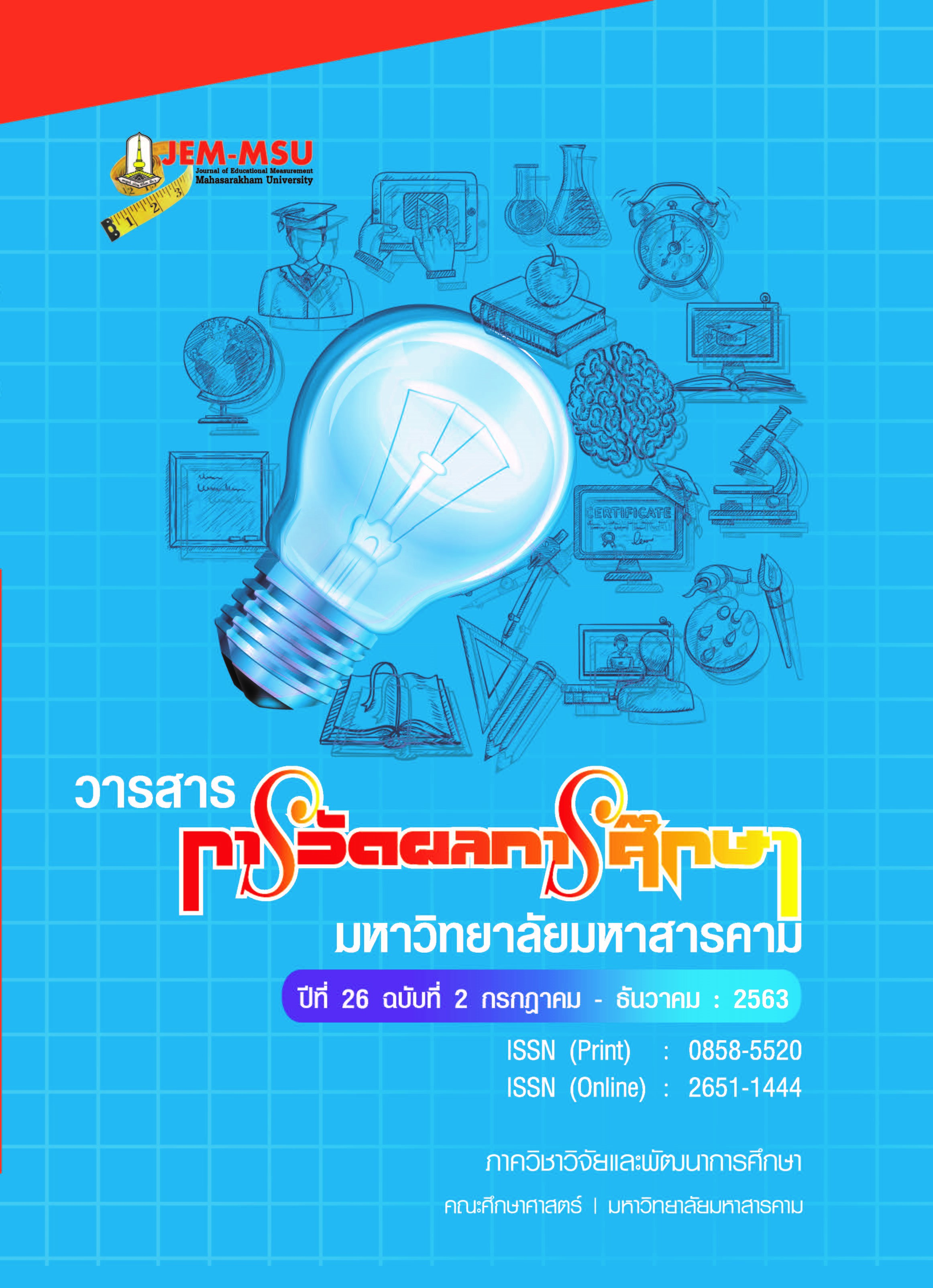Development of a Local Curriculum on the Topic of Nongkhai Special Economic Development Zone for the Social Studies, Religion and Culture Strand, Office of the Secondary Education Service Area 21
Main Article Content
Abstract
This research aimed to: 1) study the needs for local curriculum development on the topic of Nongkhai Special Economic Development Zone; 2) develop a local curriculum on the topic of Nongkhai Special Economic Development Zone; 3) try out the local curriculum on the topic of Nongkhai Special Economic Development Zone, in order to 3.1) study the efficiency of the local curriculum, 3.2) compare the pre-learning and post-learning achievements of the students. The target group consisted of 49 grade 9 students in the 1st semester of the academic year 2017 of Chumpholphonphisai School, Office of the Secondary Education Service Area 21, obtained through purposive sampling. The instruments were plans of organizing for learning, a questionnaire on the needs for local curriculum development, and an achievement test. The analysis of data employed percentage, the mean and standard deviation, and t-test was employed in testing the difference between the pre-learning and post-learning achievements.
The results were as follows:
1. From the interviews with academic teachers, teachers of the Social Studies, Religion and Culture Strand, and the basic education institution committee members, they needed to have local curriculum development and they needed it because the context of the school was appropriate, the content was specific to Nongkhai Special Economic Development Zone, it promoted readiness for prospective changes, and it could be used in daily life.
2. The local curriculum that had been developed consisted of 16 components: introduction, vision, principles, purposes, learner’s main competencies, learner’s desirable characteristics, learning substances and standards, learning standards and indicators, course descriptions, learning objectives, organizing for learning, media and learning sources, structure, time allotted, measurement and evaluation, and learning units. The content consisted of 6 learning units, namely: Unit 1-History and Background of Nongkhai Special Economic Development Zone; Unit 2-Topography of Nongkhai Province; Unit 3-Economic System; Unit 4-Population; Unit 5-Society and Culture; and Unit 6-Immunity. The results of the local curriculum evaluation by experts revealed that the aspect of the local curriculum structure, the aspect of the learning unit, and the aspect of plans of organizing for learning, were at the most appropriate level. In addition, the evaluation of the plans of organizing for learning was also at the most appropriate level.
3. The results of the local curriculum tryout revealed that the grade 9 students who studied in the local curriculum on the topic of Nongkhai Special Economic Development Zone showed:
3.1 The efficiency of using the curriculum (E1/E2) = 81.37/85.10, which was in accordance with the criterion set;
3.2 The post-learning achievement score was higher than the pre-learning score, with statistical significance at the level of .05.
Article Details
The content and information contained in the published article in the Journal of Educational Measurement Mahasarakham University represent the opinions and responsibilities of the authors directly. The editorial board of the journal is not necessarily in agreement with or responsible for any of the content.
The articles, data, content, images, etc. that have been published in the Journal of Educational Measurement Mahasarakham University are copyrighted by the journal. If any individual or organization wishes to reproduce or perform any actions involving the entirety or any part of the content, they must obtain written permission from the Journal of Educational Measurement Mahasarakham University.
References
กระทรวงศึกษาธิการ. (2551). หลักสูตรแกนกลางการศึกษาขั้นพื้นฐาน พุทธศักราช 2551. กรุงเทพฯ :โรงพิมพ์ชุมนุมสหกรณ์การเกษตรแห่งประเทศไทย.
ใจทิพย์ เชื้อรัตนพงษ์. (2539). การพัฒนาหลักสูตร : หลักการและแนวปฏิบัติ. กรุงเทพฯ : โรงพิมพ์อลีนเพรส.
เชียรช่วง กัลยาณมิตร และคณะ. (2558). รายงานผลการศึกษา เรื่อง เขตพัฒนาเศรษฐกิจพิเศษจังหวัดหนองคาย. ที่ทำการปกครองจังหวัดหนองคาย.
ปทุมวรรณ ทุมมาโย. (2553). การวิจัยเชิงปฏิบัติการการพัฒนาหลักสูตรท้องถิ่น เรื่อง การสานเปล ชั้นมัธยมศึกษาปีที่ 1 กลุ่มสาระการเรียนรู้การงานอาชีพและเทคโนโลยี. วิทยานิพนธ์ กศ.ม. มหาสารคาม : มหาวิทยาลัยสารคาม.
โรงเรียนชุมพลโพนพิสัย. (2560). การปรับปรุงพัฒนาหลักสูตรสถานศึกษาโรงเรียนชุมพลโพนพิสัย. หนองคาย.
วิชัย วงษ์ใหญ่. (2543). การพัฒนาหลักสูตร. กรุงเทพฯ : สํานักพิมพ์มาตรฐานการอุดมศึกษา.
สากล รัตนพันธุ์. (2552). การพัฒนาหลักสูตรท้องถิ่น กลุ่มสาระการเรียนรู้การงานอาชีพและเทคโนโลยี เรื่อง การปลูกหน่อไม้ฝรั่งอินทรีย์ ชั้นมัธยมศึกษาปีที่ 3. วิทยานิพนธ์การศึกษามหาบัณฑิต. มหาสารคาม :มหาวิทยาลัยมหาสารคาม.
สุริยา กำจร. (2553). การพัฒนาหลักสูตรสถานศึกษา กลุ่มสาระการเรียนรู้สังคมศึกษา ศาสนาและวัฒนธรรมเรื่อง เศรษฐกิจพอเพียง ของนักเรียนชั้นประถมศึกษาปีที่ 4 โรงเรียนวัดนาคนิมิต. วิทยานิพนธ์ กศ.ม. (การประถมศึกษา). กรุงทเพฯ: มหาวิทยาลัยศรีนครินทรวิโรฒ.
สำนักงานคณะกรรมการการประถมศึกษาแห่งชาติ. (2542). พระราชบัญญัติการศึกษาแห่งชาติ พ.ศ.2542. กรุงเทพฯ : โรงพิมพ์คุรุสภา.
สำนักงานคณะกรรมการพัฒนาเศรษฐกิจและสังคมแห่งชาติ. (2559). สรุปสาระสำคัญแผนพัฒนาเศรษฐกิจและสังคมแห่งชาติ ฉบับที่สิบสอง พ.ศ. 2560-2564. กรุงเทพฯ : สำนักงานคณะกรรมการพัฒนาเศรษฐกิจและสังคมแห่งชาติสำนักนายกรัฐมนตรี.
สำนักวิชาการและมาตรฐานการศึกษา. (2554). แนวทางการจัดการเรียนรู้ ตามหลักสูตรแกนกลางการศึกษาขั้นพื้นฐาน พิมพ์ครั้งที่ 3. กรุงเทพฯ : โรงพิมพ์ชุมนุมสหกรณ์การเกษตรแห่งประเทศไทย.


